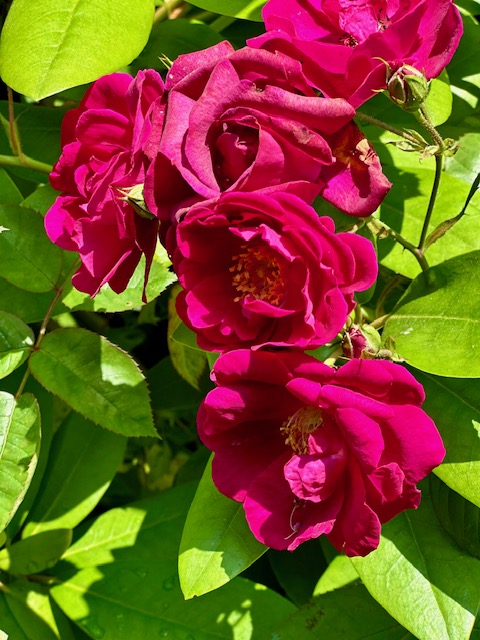The Naked Truth About Bare Root Plants
Listen, I hate to be inappropriate. What’s more, typing the word “naked” around Thanksgiving means worrying about a little extra paunch here, a little extra fat roll there. (We all pack on a few pounds over the holidays, right?) But I have to ask: What is the naked truth about bare root roses and other plants? Why would anyone trust that they can grow into something beautiful?
Well, trust, you must. Bare roots are energy packs, ready to go into the ground to burst into plant form. They possess all it takes to grow into healthy rose bushes and the like. Just add water and have a little faith. They rarely disappoint.
Growing Tips
For my first experience planting a bare root rose, I purchased low-quality bare roots at a discount store, truth being told. They truly were a little too dry, brown, and not very promising looking. I guess I must have gotten quite a bargain to purchase this particular “plant” option. Purchase, I did, and when I got it home, I did a bit of reading up on how best to plant my new acquisition.
Although I have later purchased bare root plants that I did not soak, I soaked my bare root rose in tepid water overnight. Still, the soaking resulted in something that did not look much different from what I had originally pulled from the discount seller’s commercial packaging. Nothing looked very hydrated.
I planted my bare root rose with its crown nestled under a small cone of soil that would keep it cozy. Every bit of the root material was buried in well-dug soil, enriched a bit with some new soil from that same discounter. I planted lots of other things that spring, thinking little about my rose. In fact, I think I assumed it had been a bad purchase that would do nothing. And that is when I got completely surprised. A bit of a ruddy stem developed. Some small, early leaves appeared. Then several more stems appeared, and I realized I was indeed growing a shrub rose.
Between the time of planting and the time of considering myself to have a true rose, I watered my garden, applied a little fertilizer, and thought little. I was busy, and I didn’t have time to think of wasted money on a purchase that surely could not develop into the new plant I had hoped to have. That is when, all of a sudden, my “powerpack” of roots did its thing and... voila, I was pleased beyond words.

Where to Find…
I’ve gone on to buy other bare root rose plants, other shrubs… nothing as big as a bare root tree yet. I now buy mine from real plantspeople… reputable sellers who still offer great bargains, but not mass discounters where you’ll find your plants in the same aisle as lightbulbs, sweatshirts… everything imaginable.
I don’t proclaim to be a bare root expert by any means, but I will say that I have had luck arriving at true plants each and every time I have started with nothing more than mere (“mere”…? far from mere, actually) roots. I do believe in the overnight (or less substantial) soak before planting. And I do believe in setting the roots into well-prepared ground… appropriate and loose soil, not just hastily prepared spots. Give the emerging roots a nice place to take hold, and don’t make them fight to do well. With just this minimal preparation, honestly, you’ll be amazed at what develops.
Summing Up
The naked truth about bare root rose plants and other bare root options is that they provide a wise method of purchasing plants. They generally always sell for less than potted plants, and they are easy to carry, transport, and dig into the soil. If you’re able to purchase them (generally in the earliest part of spring), you’ll walk away looking like you didn’t buy much. But you’ll be the savvy shopper… the gardener in-the-know.
Don’t worry about your extra pounds from Thanksgiving prep and Thanksgiving dinner. Just enjoy. And don’t think you always have to be on the lookout for the biggest and most fully grown plants you can find when spring rolls around. Keep an eye out, instead, for bare root plants. They’re worth thinking about now, and they’re well worth planting when the weather breaks, several months down the line.
Comments
{{ errors.first("comment") }}